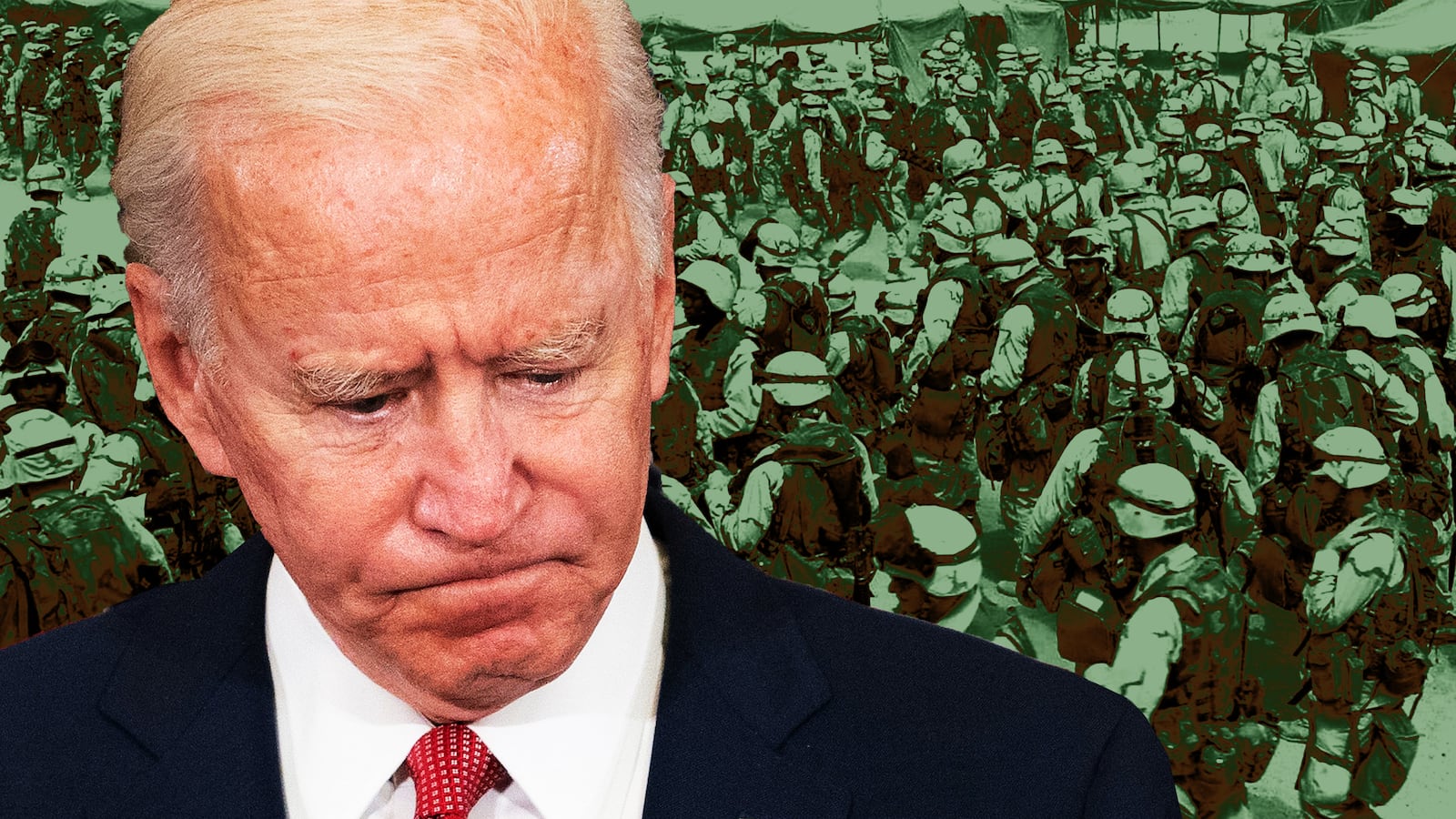The Iraqi dictator Saddam Hussein has been dead for 14 years. The U.S. Congress might finally get around to repealing the law that authorized military force against him—and has helped keep American troops there ever since.
Nixing the law, known as the 2002 Authorization to Use Military Force (AUMF), has been an antiwar priority for years, and it finally has traction in Congress. On Thursday, the House Foreign Affairs Committee will mark up Rep. Barbara Lee’s bill to repeal it. But it’s also not the 2002 AUMF that matters most. That would be the 2001 AUMF, the 60-word document written after 9/11 that birthed a global unrestricted battlefield.
Despite President Joe Biden’s pledge to “end endless wars,” despite a Democrat-controlled Congress, even despite some conservative support, there is little legislative momentum to end the key legal underpinning of the forever-conflict. While repealing the 2002 authorization is overdue—something that conceals years of unglamorous work by the antiwar movement and its legislative allies—some fear that Democrats will congratulate themselves on a job well done, take a bow, and leave the much broader 2001 AUMF in place.
“This is such a clear issue,” said Rep. Ro Khanna (D-CA), a prominent antiwar Democrat in Congress. “What’s frustrating is, in every presidential campaign, often on both sides, candidates say we’re going to get out of these wars. And now the question is whether we’re going to deliver.”
Complicating matters is the White House’s silence on how it defines “ending endless wars.” As The Daily Beast first reported, Biden has launched a counterterrorism review under National Security Adviser Jake Sullivan. But when it comes to the authorities’ repeal, the White House appears to be following Congress’ lead on what to jettison and what to keep—and for two decades, Congress’ resistance to ending these war authorizations indicates a clear preference.
Skeptical antiwar figures on the Hill consider any administration intervention in the debate to come from the position of retaining maximal operational authority. That’s what they took away from White House press secretary Jen Psaki’s statement earlier this month that Biden prefers to repeal undefined wartime authorities and replace it with “a narrow and specific framework” for counterterrorism going forward. The latest endless war, in other words, is over what it means to end the endless wars.
But one veteran of those political conflicts sees the Biden shell game as an opportunity.
“My bill to repeal the 2002 AUMF has passed the House twice, and we now have key allies in the Senate,” Rep. Barbara Lee (D-CA), the only member of Congress to vote against the 2001 and 2002 AUMFs, told The Daily Beast. “The House Foreign Affairs Committee mark-up under the leadership of Chairman [Gregory] Meeks is a huge step toward swiftly passing this bill through Congress and ending one of the longest wars in American history—but our work is far from over.”
Lee acknowledged that repealing the 2001 AUMF would, of course, be difficult. But she argued taking down the 2002 authorization would be the critical first step. “Our goal remains clear,” Lee said. “By repealing 2002 with a broad coalition of support, we will generate the political momentum necessary to rein in executive war powers and get both AUMFs off the books for good.”
Khanna, for his part, told The Daily Beast that if there was going to be a sequel to the John F. Kennedy book Profiles in Courage, then “Barbara Lee should have a chapter in it.”
Lee has also introduced a bill to repeal the 2001 AUMF. But that legislation does not have a date for a markup, despite the Democratic House successfully voting to revoke the 2001 AUMF last Congress before the bill was shoved in a filing cabinet in the GOP Senate.
The Senate is now controlled by Democrats, however. And the future of Lee’s 2001 AUMF repeal will be a critical test for how serious Democrats and the White House are about reining in executive war authority.
Lee’s proposal gives the 2001 AUMF an eight-month grace period to wind down relevant counterterrorism operations before its powers vanish. Other Democrats, though, prefer replacing the AUMF with another, narrower war authorization—something Psaki’s statement indicates the White House prefers. In the balance is how much of the War on Terror will live on.
While the absurdity of a zombie war authorization against Saddam Hussein is obvious, it took a literal decade of organizing work behind the scenes to make repeal a reality. No antiwar activist involved believes ending the 2002 AUMF is sufficient, but getting Congress to end a relic like the 2002 AUMF has been no less arduous. One House staffer and veteran of the repeal effort notes that during the Obama administration, it looked like there was consensus to do away with the measure. And then Obama used it as part of his patchwork of legal authorities for the war against the so-called Islamic State. “Who knows what contortions the future will bring,” the staffer said, “and that’s why we have to repeal it now.”
But repealing the 2002 AUMF comes with its own absurdities. It won’t spell the end of the 5,500 U.S. troops in Iraq for the current iteration of the war, since the baseline authority for that comes from an Iraqi government invitation. In other words, getting rid of the 2002 AUMF removes a law from the books, not a boot from the ground.
“Substance matters much more than the optics,” Khanna said. “The question is whether they’re going to start drawing down troops.”
Another longtime opponent of these outdated war authorities agreed with that sentiment, but he curiously took a much more forgiving tone about the White House’s inertia on the 2001 AUMF.
Rep. John Garamendi (D-CA), a liberal lawmaker who for years has sought to end both AUMFs, told The Daily Beast on Wednesday that he was willing to give the White House some latitude on the 2001 authorization during a delicate period in Afghanistan, as the government there and the Taliban negotiate a potential a power-sharing deal ahead of a scheduled U.S. troop withdrawal by May 1.
“Yes, I do support the end of the 2001,” Garamendi said, “but I’m not surprised the administration isn’t speaking to it at this moment, because they’re a month and half from a very important date, and they’re trying to figure out a way to leave.”
Garamendi’s contention is that repealing the 2001 AUMF before the Taliban negotiates an accord to end the war with the Afghanistan government will remove whatever leverage the U.S. possesses. It’s a questionable theory, given that the U.S. has already made a deal to leave, and now Biden is debating whether to functionally renege on it.
When we asked if he was part of any conversations about this with the White House, Garamendi paused for about 15 seconds. He eventually answered that he hadn’t had any “private conversations” with officials. And he said to come back to him on May 2 if Biden hadn’t withdrawn any troops from Afghanistan.
Whether this quirky gambit is real—or just imagined in Garamendi’s mind—remains to be seen.
The White House wouldn’t comment for the record, but a National Security Council spokesperson told The Daily Beast they had nothing to add beyond what Psaki had already said publicly: “The President wants to ensure that the authorizations for the use of military force currently on the books are replaced with a narrow and specific framework that will ensure we can protect Americans from terrorist threats while ending the forever wars.”
Biden has yet to offer any speech, instruction or agenda explaining how he defines endless wars, nor has he said what he is prepared to do to repeal them. Supporters note that Sullivan’s review remains underway. But Biden’s senior advisers have also taken a hedged definition of ending the wars. Repeating an Obama-era catechism, now-Secretary of State Tony Blinken in September said he wanted to “distinguish between, for example, these endless wars with the large-scale, open-ended deployment of U.S. forces with, for example, discrete, small-scale, sustainable operations, maybe led by Special Forces to support local actors.”
Blinken added that, “in ending the endless wars, we also have to be careful not to paint with too broad a brush stroke.”
Some on the Hill—like Khanna—have expressed deep skepticism about Biden’s recent airstrikes in Syria, and they note that the first step to getting rid of the 2002 AUMF, which Biden did not rely upon, has come soon after it.
Biden’s Syria strikes, a half-hearted attempt to repeal the 2001 AUMF, and Congress’ bellicose post-9/11 history all suggest a risk that Biden and lawmakers will do the least amount of repeal politically possible and claim, like St. Augustine, that the wars ought to end but just not quite yet.
For the time being, the White House appears to be backing efforts to repeal 2002, while staying conspicuously silent on 2001.
The administration has backed a proposal from Sen. Tim Kaine (D-VA) that would, among other things, end the 2002 authorization, as well as a vestigial 1991 authorization. Kaine said that the White House has been “engaged in a really good discussion” with his office on repealing war powers.
Kaine added that Biden was the first president since he’s been in Congress to take seriously the need to make war authorizations “much more tailored, not open ended.”
But that’s a line far short of repeal without replacement of the 2001 AUMF, even though Kaine said lawmakers were looking at the 20th anniversary of the 9/11 attacks as a target for repealing or revising the 2001 authorization.
“We’re going to be the drafters, because they don't need a new AUMF right now—they're not asking for one,” Kaine told The Daily Beast on Wednesday. “If there is a congressional AUMF that needs to be resolved or revised, then we're going to be the drafters of that, but we're having conversations with them to know, you know, do they have any ‘thou shalt nots’ or ‘don’t do this’ or ‘we really have a problem.’”
Sam Brodey contributed to this report.







